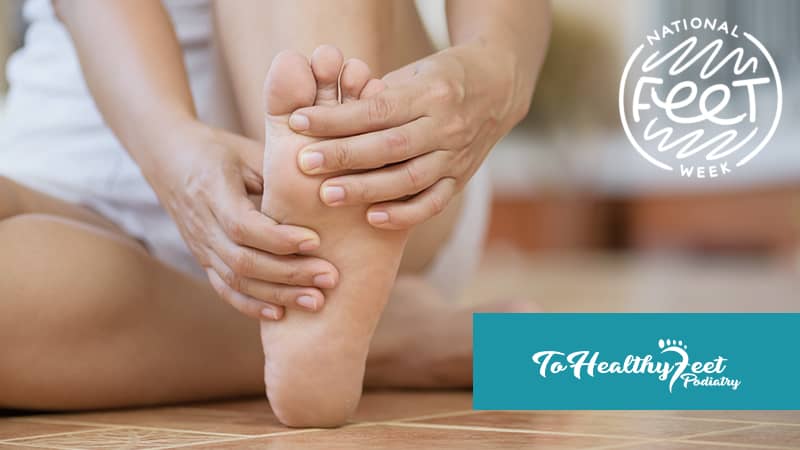Follow These Tips For Optimal Foot Health
Tips For Self Care
1. Wear The Right Shoes: Did you know that studies have shown that only about 28% - 37% of people are wearing shoes that fit properly? Choosing the wrong footwear can increase your risk for a variety of foot and ankle injuries and conditions, but bad shoes can even impact your knees, hips, and back. The wrong footwear can cause many issues including:
- Bunions and hammer toe
- Blisters, corns, and calluses
- Foot and heel pain
- Ankle and foot injury
- Nerve Pain
- Athlete’s Foot
Proper footwear should fit well, support the structures of your feet and ankles, and be comfortable.
2. Examine Your Own Feet: Knowing your own feet and foot self-examination should be a regular part of your healthcare routine. All of us are guilty of neglecting the skin on our feet or ignoring foot pain at times. Often we will take the “tough it out” or “wait and see approach”. It can be hard to know when to see your foot doctor. These are the signs that indicate you should make an appointment to see your podiatrist:
- Swelling and numbness
- Persistent pain
- Toenail fungus
- A wound or injury that won’t heal
These are great general guidelines that things could be wrong, but anytime you are unsure, reach out to your podiatrist for a complete assessment. And if you are a person who suffers with an underlying condition that compromises foot health like gout or diabetes, contact your foot doctor at any sign foot-related problems.
3. Exercise Your Feet: A simple but regular routine of exercise for your feet will improve your foot health, decrease your risk for injury, and protect your knees, hips, back, and neck. Walking is a great exercise for feet, but your foot routine should also include stretching, strengthening, and flexibility exercises. Make sure you target your toes, heels, and ankles, and also the bottom of your feet.
Tips For Professional Care
4. Try Custom Orthotics: Orthotics aren’t just for your grandma! Orthotics can be used to treat a variety of conditions including Achilles Tendonitis, Flat Feet, and Hammertoe. Orthotics are generally available over-the-counter (OTC) and as a custom molded foot therapy. OTC versions are very affordable and easy to get, but customized orthotics will be designed to address your specific dysfunction and the mechanics of your foot and step. Orthotics can help relieve pain, restore mobility, improve gait, and even aid in enhanced athletic performance.
5. Book A Medical Pedicure: A spa pedicure will leave you with soft, buffed feet and colorful polished toenails. But a medical pedicure will assess conditions of the nails and skin of your feet. At a medical pedicure, your podiatrist will diagnose and treat dysfunctions and diseases of your feet such as circulatory concerns, nerve pain and function, infection, skin pathologies such as corns, toenail conditions, and foot pain. A medical pedicure is an opportunity for your foot doctor to monitor your foot and overall health and help you devise a routine of regular foot care maintenance.
6. Consider Cutting Edge Technologies- Minimally Invasive Surgery (MIS): MIS offers you the option to finally address some of the chronic and persistent foot conditions you have neglected for years. Or it can make immediately addressing a newly developed foot condition easier to remedy. Unlike more traditional surgical practices for conditions of the feet that required large incisions and lengthy recovery times spent off your feet, MIS allows your podiatrist or orthopedic surgeon to repair a variety of conditions such as Bunions, Hammertoe, Plantar Fasciitis, and Achilles Tendonitis in office. By using smaller incisions, microsurgical instruments, and ultrasound and radiology technologies, MIS recovery times are faster, there is less scarring, and most patients can walk out of the office on their own.
7. Leverage Specialized Services Like Cryotherapy and Tenex:
- Tenex is a minimally-invasive treatment that uses ultrasonic waves to break up diseased tissue, scar tissue, and calcification in conditions such as Achilles Tendonitis, which is then removed through a small wand. This treatment does not require stitches, and has very short recovery times.
- Cryotherapy uses extreme cold to treat conditions of the foot such as Morton's Neuroma (a soft-tissue mass that can cause pain) and skin pathologies such as plantar warts (common, non-cancerous skin growths). These procedures are quick with minimal downtime.
These are just a couple of the effective and transformational treatments that your podiatrist can offer to treat foot pain and dysfunction and help you get up on your feet again.
The To Healthy Feet Podiatry Team Of NYC Podiatrists Are Your Partners In Optimal Foot Health
Our feet take a lot of wear and tear, and a lack of regular foot care can leave us vulnerable to irritating foot skin conditions, persistent foot pain, chronic and debilitating foot dysfunctions, and serious injury. We count on our feet to take us to where we need to be: support your feet by following these tips for self and professional care.
The To Healthy Feet Podiatry team of expert NYC podiatrists are your partners in preventative foot care and effective treatment of foot pain, disease, and dysfunction. We provide accurate diagnosis and comprehensive foot and ankle care and have the tools necessary to provide a variety of tailored treatment approaches at each of our Manhattan Podiatry Clinics. If you are experiencing foot pain or suffering due injury, infections, or immobility call To Healthy Feet Podiatry at 1-917-398-3668 or fill out the contact form to book your appointment at our Upper East Side, Downtown, Midtown, or Times Square locations today. The To Healthy Feet Podiatry Team is committed to ensuring that every New Yorker can walk without pain, confident of their foot health.
FAQ
Q: Are podiatry services covered by my insurance?
A: We partner with many insurance companies to assist our patients achieve optimal foot and ankle health at affordable prices. Not all treatments and therapies are covered by all providers, but our administrative team is happy to contact your insurance company to verify your benefits.
Q: How can I find shoes that fit well?
A: Shoes that fit well, that support your feet, and that are comfortable can be found at a variety of retailers at a variety of price points. If you want to explore some of our favorite shoe brands recognized for their commitment to healthy feet, click here.
Q: How can I tell if I have a nail fungal infection?
A: Typical signs of a fungal infection of your toenails include:
- Thickened, brittle, crumbly, or ragged toenails
- Discoloration (could be white, yellow, or brown)
- Distorted shape
- A darkening under your nail caused by debris buildup
- Slightly foul smell
If you suspect that you have a fungal infection, your podiatrist can provide treatment in the form of oral medications or medicated topical treatments.




